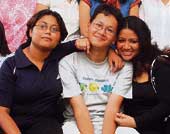 |
| A few members of the youth group Elaan. A Telegraph picture |
It was a forum for expression, a platform for discussion, a source of information. The discussion on child sexual abuse at Oxford Bookstore on Monday evening, organised by the youth group Elaan, was an eye-opener for some, a way to get across opinions and experiences for others.
The event began with a talk by Shibnath Deb, professor of applied psychology at Calcutta University and an executive council member of the International Society for Prevention of Child Abuse and Neglect (ISPCAN). And it ended with queries, comments and personal experiences from many of the young adults present.
Lack of awareness, sensitivity and information leads to a vicious circle, where the victims suffer in silence because the reaction from adults is often denial and disbelief. The guilt and shame of the sufferer lead to alienation from society, depression, frustration and suicidal tendencies, damaging the child for life, occasionally turning them into abusers.
?In India, about one in every two children is prone to abuse, while about one in every three is subjected to sexual abuse,? began Deb, with startling facts and figures. ?Child sexual abuse can be from fondling to rape. There are no laws against it, apart from a few sections under the Indian Penal Code that are not enough to deal with the problem. And boys are equally prone to sexual abuse.?
Deb has conducted a number of surveys on the issue, through United Nations projects and ISPCAN. One of the most alarming facts that emerged from a recent research in urban and semi-urban areas was that young girls are often sexually abused by their private tutors. Also present at the event was Brendan MacCarthaigh of the NGO Serve, who added that he often counsels youngsters abused by tutors.
The key to preventing child sexual abuse and also helping victims is for parents to build close bonds with their children. Trust is essential. And the starting point is creating awareness, sensitisation and documentation, in a country where data on the issue is almost non-existent. One young member of the audience felt that using scare tactics on parents would be most effective. ?If parents are made to realise that something like this could affect their child forever, then they might act,? he added.
Questions and comments poured in from the young lot, on changing the law to corporal punishment. ?Up to the age of about seven, a child wouldn?t even know what sexual abuse is. How do you help someone like that later, who doesn?t even want to admit there?s a problem?? asked one girl.
?You have to create an environment where they feel comfortable enough to want to seek help,? explained MacCarthaigh. ?This is a deep-rooted and common problem in India. But most people, including the authorities, are not even willing to acknowledge it,? he added.
Some prominent social workers attending the event added that the attitude of the system, from police officers to the social welfare department, was an obstacle.
?In a study I recently did, 35 per cent of parents and teachers condoned using corporal punishment. Educating adults is important,? added Deb.










